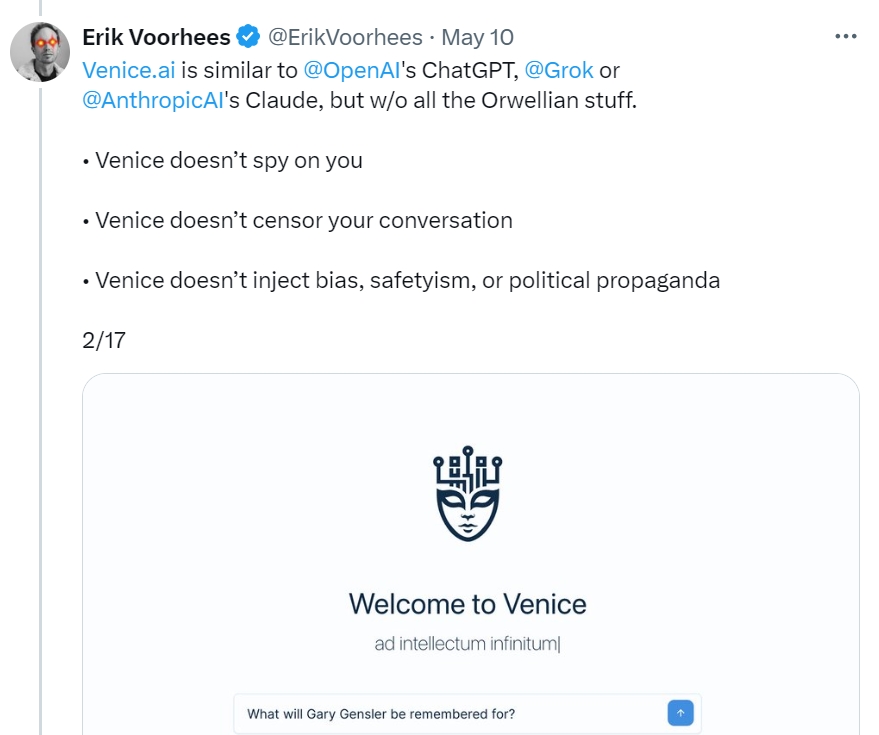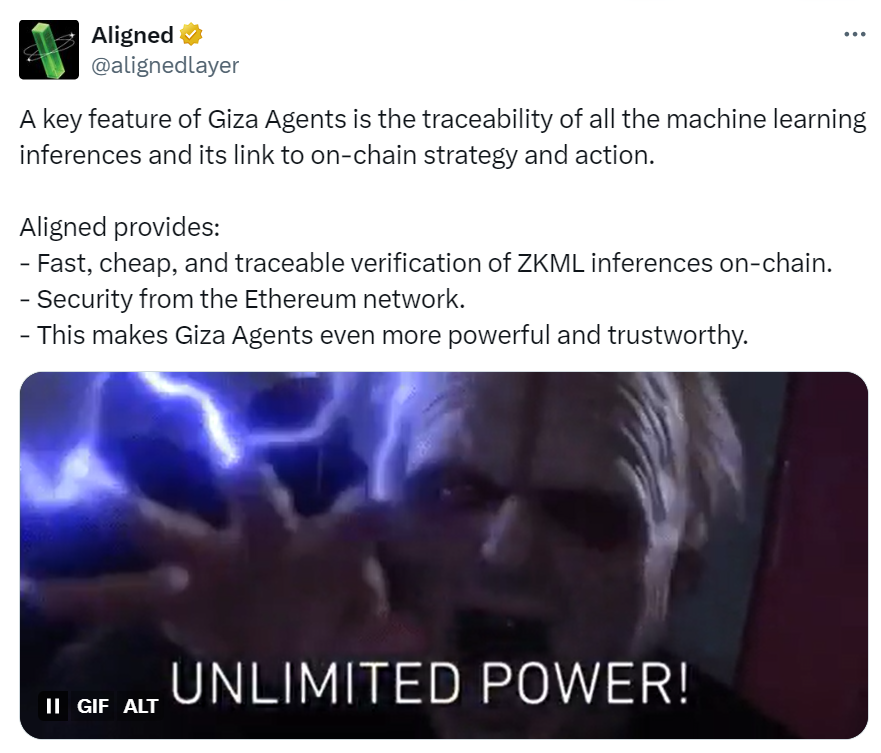The Web3 + AI Newsletter 22

Hello, everyone, and warm welcome to all newly joined subscribers!
This is the Web3 + AI newsletter, where we explore the intersection of blockchain and artificial intelligence. The Orthodox Easter took me away for a while, and so many exciting things happened in the meantime that now I have enough Web3 + AI news to fill not one, but two newsletters. Subscribe to make sure you'll receive the next one coming in a few days.
Thank you for being here! Let's dive in!
What's New in the Web3 + AI Startup World?
CARV Joins Forces with Aethir to Revolutionize AI & Gaming
CARV, the modular data layer that just attracted $10M of funding, has joined forces with the computation DePIN Aethir.
CARV is building a modular data layer that safeguards privacy while ensuring users benefit from the value created from their data. Aethir provides a powerful decentralized infrastructure that pools and redistributes idle GPU processing power. By combining CARV’s data layer with Aethir’s distributed GPU computing capabilities, the partnership will enable cutting-edge gaming and AI applications that require immense computing resources while prioritizing data privacy and user incentives.
Since both companies are dedicated to catering to the AI and gaming communities, their partnership is poised to bring about unprecedented synergies.

Erik Voorhees Unveils Venice with Morpheus, 6079
Erik Voorhees, a veteran crypto entrepreneur-turned Crypto x AI advocate and contributor, has unveiled Venice.ai, an uncensored, unbiased, and private Generative AI model.

“While Venice is not a crypto product, nor confined to America, it is architected upon the crypto ethos, and quite radically American: imbued with unapologetic sovereignty for the individual”. The focus is explicitly on ease-of-use, open-source technology, and privacy:
Venice utilizes leading open-source AI models (we’re fond of Nous Research) to deliver text, code, and image generation to your web browser or mobile app. (...) No downloads. No installations of anything. And for basic use, no account necessary and the service is free.
Claude, ChatGPT, Grok, Perplexity and the rest have your entire conversation history saved and attach it to your identity, forever. Worse, they siphon it off to various 3rd parties—advertisers, hackers, and most dangerous of all, governments.
Voorhees has published a long-form blog post listing his arguments for the need of decentralizing intelligence, and I recommend you reading it. It paints quite an adequate picture of Big Tech's current efforts to stifle open-source innovation in AI under the pretext of risks for humanity's survival.
We are witnessing the potential serious risk of a yet unseen phenomenon like AGI used implicitly or explicitly as justification to control all manner of non-AGI artificial intelligence technology. It’s a sleight of hand.
.png?format=1500w)
Venice is part of the open-source decentralized AI project Morpheus, and was built in collaboration with Hugging Face, Meta, Stability AI, Hyperbolic, Mistral AI, Akash, and others.
In the meantime, Morpheus has shared it was working in tandem with another emerging player in the permissionless AI space, namely 6079. 6079 is a trustless AI operator, poised to act as a verification layer between GPU resources providers and AI applications, thanks to its Proof-of-Inference (PoIP) protocol. Together, they target to challenge the supremacy of Big Tech giants by employing decentralized, permissionless AI technology.
Giza to Showcase Autonomous Agents on Starknet
By the end of the month of June, the decentralized AI company Giza will deploy yield-optimizing agents on the Ethereum Layer-2 chain Starknet as part of its Agents Launch program. Other chains, as well as other types of agents, like portfolio re-allocating ones, will follow.
In the beta phase, the Giza team will be auditing and approving agent strategies to ensure security. In the future, Agents will become completely permissionless through the Giza Protocol, which will provide both cryptographic and cryptoeconomic security to ensure a trust-minimized exchange between developers and users.
Apart from Starknet, Giza announced a couple more Agents Launch Partners, including tokenized deposits platform Enzyme Finance and proof verification optimizer AlignedLayer. Thanks to the help of Aligned, Giza will be able to verify the on-chain inferences of its ZKML (zero-knowledge machine learning)-powered agents much more quickly and cheaply.

Finally, for the machine learning aficionados among you, Giza recently released a series of tutorials on how to run traditional ML models as ZKML ones suitable for Giza platform applications. Find out how to run a verifiable inference using a Decision Tree and a Linear Regression. Giza even came up with ZKBoost, XGBoost for ZKML.

Galxe Integrates with Worldcoin
Galxe, one of the largest community growth and engagement platforms in Web3, has announced its integration with Worldcoin's identity protocol World ID. Although Galxe had already deployed its own self-sovereign identity infrastructure, powered by zero-knowledge proof technology, the company will now reinforce its data privacy and security using World ID.
Why is this important? Worldcoin was founded by OpenAI's Sam Altman with the aim of using biometric data as a proof of personhood to distinguish humans from AI. Its activity has been highly controversial since what it does in practice is collecting users' iris biometrics in exchange for “free money” payments in crypto. Meanwhile, the company has been repeatedly hit by regulatory actions over concerns about the ways it stores and processes the facial recognition data it collects.
However, Worldcoin remains a popular project within the Web3 community, and now that Galxe is about to use its proof-of-humanness tech to fight bots, it gets more and more legitimized. Moreover, Worldcoin's ambitions don't stop there. It targets to serve as the foundation of global democratic organizations and DAOs as a more equitable option as opposed to the more prominent token-based voting mechanism based on wealth.

Hyperbolic Introduces spML Verification of AI Inference
The decentralized computation and AI services provider Hyperbolic has revealed a novel mechanism to verify decentralized AI inference, called spML. It is based on Hyperbolic's Proof-of-Sampling (PoSP) protocol, which the company created in collaboration with researchers from University of California, Berkeley, and Columbia University.
It combines math, computer science and economics, deploying “advanced sampling methods and game theory to incentivize integrity and minimize computational demands across decentralized networks”

SpML, designed specifically to address the problem of verification in on-chain AI inference, builds on existing methods relying on optimistic assumptions and fraud proofs (opML) and zero-knowledge proofs (zkML).
So, spML improves on opML and zkML by synthesizing their strengths and effectively addressing their weaknesses. It offers better security than opML by reducing the probability of undetected fraud, while maintaining scalability and efficiency. Compared to zkML on the other hand, spML provides a more scalable and efficient solution by reducing the computational overhead associated with zero-knowledge proofs, while still ensuring a high level of security through its sampling-based approach.
Prime Intellect Launches Grants to Boost Decentralized AGI
The decentralized AI research platform Prime Intellect launched Fast Compute Grants for ambitious AI researchers, engineers, or architects building novel models and techniques. This grant announcement came right after the company had secured a $5.5M investment. Grant candidates will be eligible to receive free computation credits on the Prime Intellect platform worth between $500 and $100,000, as well as promotional support and networking.

Aizel Chooses peaq Blockchain
Aizel, an on-chain verifiable AI inference network, has opted to build on top of DePIN focused Layer-1 chain peaq. Aizel's mission is to enable decentralized inference, aimed at making AI harder to tamper with and more transparent.
As part of this integration, Aizel commits to issue its native token on peaq, handle AI model uploads via peaq, and leverage peaq's SDK to make its tech stack compatible.

Gnosis AI with Olas
The May showcase call of Web3 + AI projects building on top of Gnosis Chain featured Olas, previously known as Autonolas, a unified framework for automation and co-owned AI. David Galindo, co-founder of Olas' mother company Valory, presented a demo of agents-powered prediction markets.
The Olas autonomous agents are able of acting as researchers, traders, market creators, and market closers. These four families of agents are what compose Olas Predict. Running a trader agent is made extremely easy, and it is even incentivized. Olas has come up with an innovative approach, called Proof-of-Active-Agents (PoAA), that allows operators to generate yield once the trader agents they are operating reach a certain activity threshold.

Noteworthy Podcasts, Articles, Events
The Web3 and AI Funding Bulletin | April II
My second Web3 and AI Funding Bulletin is out, covering all capital rounds from the second half of April. This time, venture capital firms graced Web3 + AI projects involved in various use cases, including gaming, decentralized computation and inference, and research.

Elliptic and MIT-IBM Crack Down Bitcoin Money Laundering
Blockchain analytics firm Elliptic has published a paper describing new patterns of illicit BTC transactions through the use of AI. The research, performed in collaboration with MIT-IBM Watson AI Lab, has made significant advances in Bitcoin money laundering detection.
Elliptic first released a similar deep learning model back in 2019, but it was based on a dataset of only 200,000 transactions. On the other hand, Elliptic2 was trained on a large graph dataset containing 122,000 labelled subgraphs of Bitcoin clusters within a background graph consisting of 49 million node clusters and 196 million edge transactions, so, naturally, it is much more effective.
"Crypto laundering practices will evolve over time as they cease being effective, but an advantage of an AI/deep learning approach is that new money laundering patterns are identified automatically as they emerge."

Chris Dixon Talks Blockchains with Rick Rubin
Chris Dixon, a long-time tech entrepreneur and investor, has generated a lot of excitement within the Web3 space with his recently-released book “Read Write Own”. In it, he advocates for blockchain technology as the engine behind a new, much fairer and more democratic, era of the evolution of internet and our digital society.
I'll share my review of the book as soon as I finish reading it, but until then, I recommend listening to Dixon's participation in Rick Rubin's podcast Tetragrammaton. Per his own words, the legendary music producer was completely unaware of what blockchain is and why it is important, but Dixon's book helped him understand its benefits. That is why, I believe this talk may be quite useful to newcomers into the crypto space aka 'normies'.
Disclaimer: None of this should or could be considered financial advice. You should not take my words for granted, rather, do your own research (DYOR) and share your thoughts to create a fruitful discussion.












